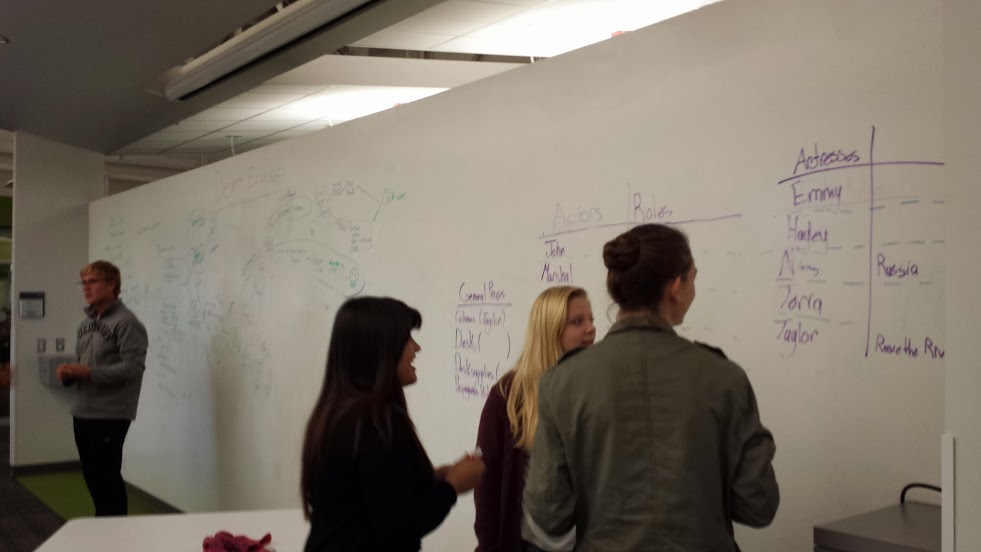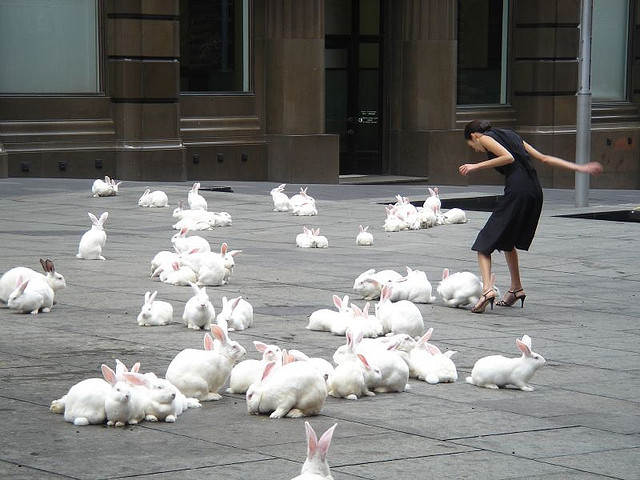It’s tough. We want so badly for our students to be successful that sometimes we forget what the road to success looks like. Hint: it’s filled with stuff that’s not very rewatchable. Russ Goerend
We finished our Choose Your Own Adventure YouTube video project a couple of weeks ago and I have been putting off this post. I was disappointed and a bit embarrassed by how it turned out. Russ summarizes my feelings nicely. It was the culmination of a project studying WWI and WWII from the American perspective. We had each class of 40+ students working on creating these videos stores as a group. Yup, forty students working together on one final product. It was a bit like…
It was a challenge organizing this endeavor but we left as much as possible up to the students. Students did a nice job of storyboarding and dividing up into roles such as writers, actors, directors, props, and editors. The breakdowns started when the directors did not get files to the editors immediately. Clips that had poor audio, bad lighting, and mistakes did not get previewed until days after shooting them. Video files were contaminated and some of them were lost. In the end one class ended up with no final product and the other class’ video was incomplete and only partly uploaded to YouTube with very poor editing.
 I wanted to brag about how good this project was and show off an amazing final product. It didn’t happen this time. Yet the students worked hard. They brought in props and costumes and wrote a decent script. They tried to do everything right, but they are not professionals. The first scenes took a long time to film as they figured out set, props, and lighting. The majority of them had zero experience in any of their assigned roles. They were also under a tight time schedule as we had a field trip planned to launch our next, grade-wide project. There was no way that we could not give them more time. From my perspective I wished I had organized the editing part of the project better.
I wanted to brag about how good this project was and show off an amazing final product. It didn’t happen this time. Yet the students worked hard. They brought in props and costumes and wrote a decent script. They tried to do everything right, but they are not professionals. The first scenes took a long time to film as they figured out set, props, and lighting. The majority of them had zero experience in any of their assigned roles. They were also under a tight time schedule as we had a field trip planned to launch our next, grade-wide project. There was no way that we could not give them more time. From my perspective I wished I had organized the editing part of the project better.
In PBL we always say that “the process is more important than the product.” In this case I feel that is true. The final product may not have turned out to be anything that the students are proud of but the effort and the skills learned were. I also know that future video projects will be better due to this experience. You don’t win an Oscar in your first movie. So though I was disappointed at first due to unrealistic expectations on my part, upon reflection I am proud of what students did and how they grew from the experience.


Thanks for this post, I love the honesty. Last year I had my students constructing catapults that could launch 8 lb projectiles. They had 3 weeks to do it and it’s all we spent class time on. I picked the launch date and told the whole campus about it. When the day came, we were very excited and optimistic. Then they started to carry their contraptions out. One fell apart just being carried. The others vied for the winning throw (only that team could get an “A” on the project) and the winning throw was . . . 5 ft. Ugh. I was embarrassed and tried to shy away from my colleagues, my dean, and other students. It wasn’t until later that I came to similar conclusions that you mention here. They learned a lot about engineering (the main topic of the course) and they learned even more about teamwork.
So, fast-forward to this year. I showed this years’ class the video from last year (that starts with optimism and ends with disappointment) and they all said things like “didn’t they test?” and “we’ll beat that!” So, I started to get excited again, but I think your post came at just the right time for me. I’m going to redouble my efforts to make sure they’re getting as much from the experience as possible, and I’ll be fine if they repeat last years’ efforts.
Some questions: How do you help students see the value of a “failed” project? Would it better if you gave them 2 chances or something like that? What kinds of talking points do you use to downplay the overall success of the project?
Andy,
For this project, we just ran out of time to have them do it a second time. It was such a large project that it would take weeks to re-do. We did a video project for our next one also and stay tuned for a post for a creative way that we gave them a “second chance.”
I like what my science teacher does. When students try an experiment and do not get the results they hoped for he gets very excited and says “You failed!” and gives high fives! Then he encourages them to see what they learned and what they should try next.
A lot of what we do is have discussions about the projects afterwards about what we learned and what we (including the teachers) could do better next time. I also think sometimes the fact that I admit that a project bombed and take blame for it helps students feel comfortable with failure, especially feeling free to experiment.
Pingback: NaBloCoMo results | SuperFly Physics